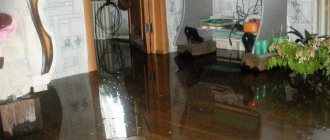Sometimes we, wittingly or unwittingly, become participants in unpleasant incidents. For example, we had a flood, and water, having overcome the ceilings, flooded the apartment from below. And it’s good if only one!
Not only do you now need to do unscheduled repairs in your own home, but you also have to pay off the damage to your neighbors. So, you flooded your neighbors below: what to do in such a situation? We'll talk about this in our article. We will also look at how to identify the culprit of the flood and correctly draw up a flood report.
We will present possible scenarios for the development of events and ways to solve the problem, examining in detail a peaceful settlement through constructive negotiations and eliminating claims in court.
We are looking for the culprit in the flood
The answer to this question is not at all as obvious as it may seem to your neighbors. In apartment buildings (MKD) there is common property that belongs to all owners of the residential premises of the building. The procedure for its maintenance is established by the Rules approved on August 13, 2006 by Government Decree No. 491 (hereinafter referred to as the Rules).
Elements of engineering equipment and general building communications are also located in the residential premises of apartment owners.
If the management company is negligent in fulfilling its responsibilities for the maintenance of common property, you can contact its management with a written complaint, without bringing the situation to an emergency
Such property includes:
- hot and cold water supply risers;
- sewer pipeline;
- central heating system.
In accordance with the rules, improper maintenance of the common property of an apartment building entails the responsibility of the organization with which the homeowners entered into an appropriate agreement, that is, the management company - the management company.
Option #1 - management company
If the leak occurred due to an emergency condition of the riser, managers will have to compensate for the damage caused. By the way, flooding resulting from a leak in the roof of an apartment building is also the fault of the management company.
But it is worth paying attention to the circumstances that contributed to the leak. For example, you yourself, without notifying the operating organization and without obtaining permission from it, replaced the sewerage or water supply risers. Such actions are illegal, as are any unauthorized interference in the operation of these communications.
If the fact of such unauthorized intervention is established, the owner of the apartment in which the illegal work was carried out will bear responsibility.
Option #2 - apartment owner
The first shut-off and control valve, which turns off the water in the apartment, separates the common property from the property inside the apartment. If the pipe was damaged after this tap or water was leaked due to faulty plumbing or other equipment connected to the water supply (washing machine, dishwasher, etc.), then the owner of the apartment - the source of the flooding - will be responsible.
Do not leave a running washing machine or dishwasher unattended; When drawing water into the bath, make sure that the technological hole for overflowing water is not blocked
But even in this case, there may be nuances that need to be taken into account.
These include:
- Availability of tenants. The owner may not live in the apartment. If the leak was caused by employers or tenants who officially live in a given place in accordance with the concluded agreement, it is necessary to read the terms of liability specified in this agreement.
- Defective equipment. When buying a washing machine or dishwasher, a toilet with a tank, mixers, taps and other equipment, keep your receipts. They confirm the fact of purchase and allow the owner to issue an invoice to the seller if the examination finds the product sold by him to be defective. In this case, the seller will also have to answer for damage caused by the faulty products he sold.
- Poor quality repair or installation work. If a hired organization has installed equipment in violation of standards, it will be held liable for poor quality work and for the negative consequences caused by this circumstance.
Sometimes flooding can be caused by a water hammer or electrical surge. In this case, resource supply organizations may be at fault. But do not forget that running electrical appliances (washing machine or dishwasher) should not be left unattended.
If the apartment is rented, then the owner of the apartment is usually responsible for a faulty tap or emergency pipe located in the owner’s area of responsibility. But for overflow in the bathroom or kitchen due to an unattended open tap, the tenant is responsible.
As you can see, having established the cause of the flood, we will determine the culprit of what happened. But sometimes it will be necessary to spend both money and time to identify the truth.
Option #3 - third parties
If you are certain that third parties are at fault, then it’s time to remember that your apartment and property were also damaged. To record the fact of flooding and determine the damage caused by water, a flood report should be drawn up.
The owners of the apartment from which the leak occurred are not always to blame for the emergency situation: sometimes they suffer from the flood no less than others
It's time to determine which of the lower neighbors were injured during the accident. Explain to them the reason for what happened. Start collecting documents that will be useful to establish the fact and extent of damage. Try to photograph and videotape everything that happened.
The culprit of the management company or HOA
Before filing a claim, the injured party must contact the guilty company with a claim and offer to settle the issue amicably. In case of refusal/no response, you can start legal proceedings.
Several apartments could have been flooded: due to the fault of the management company, the neighbors above flooded the neighbors below. In such a situation, you need to go to court with a collective complaint.
If for some reason a representative of the Criminal Code does not appear at the court hearing, but is duly notified, the court will consider the case without him.
and HOA.
Nuances of drawing up an apartment flooding report
The act, which records the fact of flooding and the damage caused to the victim’s apartment and property, is perhaps the most important document for you. Therefore, its content should be taken very seriously.
To draw up this document, be sure to invite two or three witnesses. Then it turns out that the act is drawn up by a commission. It’s good if the document itself and the defective statement that is attached to it are signed by a representative of the management company. If he refuses to sign, simply note his refusal in the act itself.
This document must contain the following information:
- you need to record the fact of flooding of your home, indicating the date and time the report was drawn up, the full address of the apartment, the number of rooms in it and the floor on which it is located;
- description of the damage caused to the premises and property (furniture, household appliances) located in them;
- the cause of the leak (exact, if it is not in dispute, or suspected).
In fact, drawing up such an act is the responsibility of a representative of the management company, but it is better to duplicate this document, especially if disagreements arise during its preparation.
Practice shows that management specialists try to “ignore” their own guilt in any situation, reduce the scale of the consequences of the accident and ignore facts that are significant for the injured party. Sometimes they even try to delay the writing of the act, so as not to draw it up at all.
Not all damage from flooding appears immediately: sometimes it takes some time to realize that the floor covering has failed, and fungus has grown under the wallpaper
The act must reflect all disagreements that arise between the parties during the determination of the culprit of the accident or when establishing the amount of damage. By the way, all damage caused to the victim’s property may not be detected immediately, but after 2-3 days.
For example, yellow circles may appear on the walls or the parquet floors may rise. These property losses can be included in the defective statement as an addition.
If you are the culprit of the flood, be sure to receive one copy of the report and the defective statement so that it does not “accidentally” include, for example, broken household appliances that have nothing to do with the incident.
The next step is to file a claim with the person responsible for the flooding. This can be done by all victims collectively or each individually.
Threat of trial
You may encounter neighbors who are aggressive not only towards you, but also towards the entire world around you.
And they will not even listen to explanations about what caused the flooding, who is to blame for what happened. From the very first minute they will threaten to sue and demand a large amount of compensation. If you cannot find mutual understanding, you need to act competently, calmly, and protect yourself from unnecessary claims:
- Still, it’s worth trying to talk, come to an agreement, and explain that the trial is not beneficial for them either.
- Does not work? Be sure to record the destruction in the apartment below. You need to film a video or take high-quality photos. You should have a clear picture of how much damage the neighboring property has suffered. Unfortunately, you can also be denied permission to visit your neighbors’ homes.
- You should draw up a flood report according to a model that is not difficult to find on the Internet. When filling out such a document, not only the parties to the conflict must be present, but also independent witnesses.
- The act is not a simple paper; it must be signed by the chief engineer of the company servicing the house, a plumber. If it is proven that the flooding is the fault of the housing office or the management company, the document will be one of the main ones in the proceedings. It is also important to have a copy of this act signed by the indicated persons.
Damage assessment options
As a result of flooding, the room as a whole suffers: the suspended ceiling may sag, wallpaper and decorative elements may peel off, and laminate or parquet flooring may be damaged. Electrical wiring may fail. Wet furniture loses its appearance, equipment burns out. How to assess damage in monetary terms?
Drawing up a pre-trial agreement
If the injured party expresses a desire to reach an agreement out of court, you can use one of the following assessment methods:
- Take the flooding act as a basis and, together with your neighbors, estimate an approximate amount of compensation that could suit both parties. If agreement between the parties is reached, then this fact must be recorded by drawing up a separate agreement. Indicate the agreed amount in it and confirm it with signatures.
- You can determine the consumption and types of materials that will be needed to carry out work to restore the damaged apartment, after which the culprit of the flood buys all this in the store at his own expense and pays for the repair work.
It would be better to formalize this agreement in the form of an act, so that the victims do not change their minds.
One of the advantages of a peaceful resolution of the conflict is the ability to quickly eliminate the negativity that has arisen as a result of the Gulf: courts take up time, energy and health
In the acts, do not forget to mention that after repayment of the damage, all claims of the injured party will be fully satisfied. Money must be transferred only with a receipt for its receipt. After completing the work, you also need to take a receipt stating that the agreed work of proper quality was completed in full.
Conducting an independent examination
If the parties to the conflict cannot agree on the amount of losses, you can seek the help of independent specialists:
- An appraiser from an appraiser agency or the Chamber of Commerce and Industry may be invited as an independent expert. An agreement should be concluded with him, and, based on the results of the work performed, he should draw up a conclusion and issue a receipt for payment for his services. The expert's services can be paid by one or both parties in agreed shares.
- It is possible that the expert’s conclusion will not satisfy the parties, then the only thing left to do is go to court.
Based on the act of flooding, photographic and video materials, testimony of witnesses and documents confirming the value of the damaged property, the court must make a decision. He may request an examination.
The ideal option may be to choose an independent appraiser who is fully trusted by both parties to the conflict.
Judicial proceedings are not a quick matter. When embarking on this path, you should have a good idea of the prospects for your business.
Where to go, in what case do you need the help of a lawyer?
You can seek the help of specialists (an expert or a lawyer) at any stage of resolving the issue. But most often this is necessary when the parties cannot come to one solution.
- Independent examination. Either party can order an appraiser. It is this party that pays for the services accordingly. Often the parties agree to split the payment between themselves. Based on the results of the written conclusion, payment is made. But if one of the parties still does not agree with the results, you can apply for additional expertise. Or go straight to court.
- Drawing up a claim against the Criminal Code, a statement of claim to the court. Lawyers in civil cases will help you correctly draw up documents if the culprit is the management company, and will also represent the interests of the client.
Ways to resolve conflict
The matter will end with minimal losses on both sides of the conflict if both sides show a desire to communicate politely and constructively.
Method #1 - bilateral constructive negotiations
You can always find a compromise option if the victims remember that there has been no repairs in their apartment for a long time, and the damaged property was old, although it was in working order.
The trial is not beneficial for both parties to the conflict: these are additional costs associated with the trial itself and preparation for it in the form of an independent examination
Perhaps an aggressive neighbor can be influenced by the following arguments, presented by third parties whom both parties trust:
- Before the trial begins, the plaintiff will need to pay a state fee, depending on the amount of the claim. That is, he will incur preliminary costs. Also, his expenses should include the services of a consultant and lawyer.
- We do not have case law, so it is very difficult to say exactly which side the court will support. It is possible that the plaintiff's expenses will be in vain.
- If the court decides to order an examination, the plaintiff will also pay for the services of an independent appraiser. The court needs the opinion of a specialist, on whose data it will rely.
- The source of compensation for damage established in court can only be the earnings that the defendant officially receives. If the defendant does not have an agreement (contract) with the employer, then the maximum amount that the court will oblige him to pay is 1/5 of the subsistence level.
Usually, the realization that you can get a certain amount now by agreeing peacefully, or by a court decision to collect pennies for a long time, which will inevitably be eaten up by inflation, is sobering.
Perhaps the victims are simply not aware that when calculating damage, they take into account not the purchase price, but the estimated value of the property. For the money you can get as a result, you won’t be able to buy new equipment. At best, you can simply repair the old one.
There are also some nuances when claiming moral damages. Since moral suffering is an ephemeral concept, and the court needs material evidence, you will have to present extracts from the medical record confirming the facts of visiting doctors in connection with deteriorating health due to experiences associated with flooding. Receipts from the pharmacy will also work.
Method #2 - resolving the conflict in court
Not in all cases conflicts end in peace. What awaits you in court if you really turned out to be the culprit of the flood of your neighbors downstairs? As practice shows, the court usually sides with the plaintiff. The factual presumption of guilt of the defendant can be overcome by facts in one's defense.
The defendant is recommended to provide evidence of his innocence in writing in the form of objections. Arguments must be argued, confirmed by photographs and videos, and testimony of witnesses.
All objections of the defendant to the essence of the claim must be expressed in writing, fully reasoned and confirmed by testimony of witnesses, photo and video documents
The most effective arguments can be considered the following:
- the flooding occurred as a result of the management company’s improper performance of its duties to maintain communications;
- documentation regarding the inspection of the premises after the flood, as well as the assessment of damage, is not objective, since the inspection was carried out in the absence of the defendant or his comments were not reflected in the report, signatures and other significant details are missing;
- The plaintiff’s demands were inflated because the depreciation of his property was not taken into account or work that was not related to the elimination of the consequences of the flood was included.
The culprit of the accident must understand that if his arguments are not accepted by the court, he, in addition to the main amount of the claim, will have to reimburse legal costs, which include state fees and fees for the services of a lawyer, legal adviser, and independent expert. Therefore, every effort must be made to resolve the conflict peacefully.
Now just imagine how many troubles and expenses could be avoided if you insure your liability in case of flooding of the neighbors’ apartment below
The court pays special attention to class action lawsuits. If there are several flooded apartments, then most likely the demands will be collective.
Obviously, out of prank or malicious intent, a normal adult will not flood the neighbors from below, but the possibility of such a situation cannot be ruled out. After all, that's what an accident is. But, despite the fact that the damage to the property of neighbors was caused accidentally, the troubles for this can be very, very significant.
If you are accidentally flooded by your upstairs neighbors, we recommend that you figure out where to go and how to act in this situation.
Self-settlement
The most serious situation is when the injured party does not even want to listen to the explanations of the culprit and immediately threatens to take the case to court. But she needs to take into account that she will also have to pay a certain amount for the services of an expert appointed by the court and the costs of the work of the judicial authority.
- The court, when assigning payments to the perpetrator, will take into account his official earnings. Since such a payment cannot be more than 1/5 of the subsistence level, the full amount of damage will have to wait several months or more. If you agree among yourself, you can achieve a more profitable solution.
- The court will definitely appoint an expert, for whom the injured party must pay - after all, it was she who initiated the legal proceedings. Expert services are not cheap, so it is better to negotiate fairly among yourself.
The amount of damage will be calculated by the court based on the estimated value, and it does not always coincide with the actual price paid for the property.
Sometimes the injured party even demands compensation for moral damage. It is difficult to prove the need for such a payment; you need confirmation from a doctor, a receipt for medications from a pharmacy. But, first of all, it is necessary to prove the connection between the deterioration of health and the fact of flooding.
Conclusions and useful video on the topic
However, you can insure your civil liability for flooding your neighbors. Learn about this insurance company product from the following video:
A video consultation with a representative of a law firm will allow you to systematize the information contained in this article, summarize all the information received and determine your sequence of actions in the event that you are to blame for the flooding of housing located on the floors below.
If you received the information contained in this article before the unpleasant flooding situation occurred, we hope that you will protect yourself by once again checking the condition of plumbing fixtures and household appliances connected to the water supply networks. It is quite possible that you will decide to insure your civil liability, which is also correct.
Are you familiar with the flooding of your neighbors' property from downstairs? Share your experience with other users, tell us how serious your situation was and whether you managed to resolve it peacefully. Or maybe you specialize in legal support of such cases in court and want to supplement our article with useful recommendations? Write your comments in the block below.
Who pays
All losses incurred by the victim are compensated by the guilty person in full. The first thought when flooding is: it’s dripping from above, which means the neighbor who lives upstairs is to blame. But the law still sides with innocent owners. If they can prove that the cause of the flood did not depend on them, they will be exempt from compensation for damage.
The main task of the owner is to prove that the flooding of the neighbors below was not his fault, but the fault of third parties, organizations or circumstances.
The neighbors below are flooded, but yours is dry
At the request of residents, the management company can send a specialist to identify the source of the leak.
It often happens that neighbors downstairs constantly complain that they are “dripping from the ceiling.” But you are not able to find out the reason, since your apartment is dry and there are no leaks.
In such a situation, you should not go into conflict. It is necessary to report the problem to representatives of the management organization, who are obliged to send a specialist to determine the causes of the leak.
What is damaged property?
Life often presents surprises, but not all of them are pleasant.
One of these may be property damage. And although the country’s legislation clearly defines all the nuances regarding this, not everyone knows the exact definition, as well as in what cases an assessment of damaged property is required, who can do it, and why the owner needs it. All these questions will be answered in this article. According to the official definition, damaged property is considered to be such property that, due to the influence of external factors or, conversely, due to the inaction of responsible persons, has become so damaged that:
- its quality has deteriorated (performance has decreased);
- the cost has decreased;
- the property cannot be used at all or to its full extent.
That is, real estate, equipment, securities, raw materials or supplies, machinery, livestock or other material assets were not completely destroyed, but returning them to their original state requires investments of money and time. Moral and other types of damage are assessed and approved according to completely different standards and principles.
On a note! Various types of documents also do not fall under the official definition, since according to the law they are not property, and therefore their damage and damage associated with this are not assessed on a general basis, but require special proceedings!
If the apartment owner's liability is insured
Even if you flooded your neighbors, you can avoid paying for damages. To do this, you need to take out liability insurance as a property owner. The insurance company will be required to issue payments to the injured parties if you flood your neighbors.
First, notify the insurer that an insured event has occurred. If you do not do this on time, your payment will be denied. Then follow the eight-point instructions posted above.
When the apartment is insured, the neighbors are compensated by their insurance company. She then issues you an invoice for the amount paid. The amount of compensation depends on the terms of the contract.









